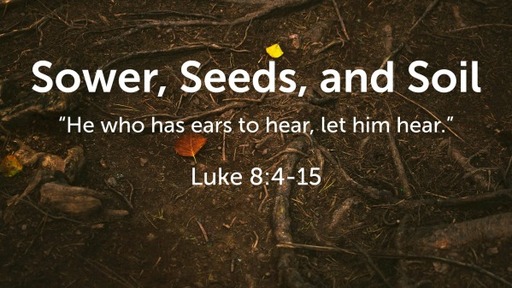Sower, Seeds, and Soil

The Parable itself:
How did Isaiah obey this strange commission? Certainly not by preaching with obscure expressions and complex reasoning. On the contrary, Isaiah’s preaching was plain, systematic, and reasoned. In fact, “the sophisticates of his day scorned him as fit only to conduct a kindergarten.”1 They disdained him, saying, “Who is it he is trying to teach? To whom is he explaining his message? To children weaned from their milk, to those just taken from the breast? For it is: Do and do, do and do, rule on rule, rule on rule; a little here, a little there” (Isaiah 28:9, 10).
So Isaiah fulfilled his commission to blind and harden the people by clearly preaching the truth, and when they rejected it he preached it again in the clearest form possible, so that their repeated rejections effected an increased hardness of heart. Some hearts were so hardened that they went beyond the point of response.
Essentially there were, and are, four kinds of hearts that hear God’s Word: a hard heart, a shallow heart, an infested heart, and a good heart. All four hearts were present in the large crowd that listened to Jesus that day, and they are present in every large assembly of the church today. Jesus wanted his hearers to truly listen.
According to Luke, Christ says that they believe for a time; because that honour which they render to the Gospel resembles faith.3 At the same time we ought to learn, that they are not truly regenerated by the incorruptible seed, which never fadeth, as Peter tells us, (1 Pet. 1:4;) for he says that these words of Isaiah, The word of God endureth for ever, (Isa. 40:8; 1 Pet. 1:25,) are fulfilled in the hearts of believers, in whom the truth of God, once fixed, never passes away, but retains its vigour to the end. Still, those persons who take delight in the word of God, and cherish some reverence for it, do in some manner believe; for they are widely different from unbelievers, who give no credit to God when he speaks, or who reject his word. In a word, let us learn that none are partakers of true faith, except those who are sealed with the Spirit of adoption, and who sincerely call on God as their Father; and as that Spirit is never extinguished, so it is impossible that the faith, which he has once engraven on the hearts of the godly, shall pass away or be destroyed.
Although Christ has cleansed the Church with his own blood, that it may be without spot or blemish, yet hitherto he suffers it to be polluted by many stains. I speak not of the remaining infirmities of the flesh, to which every believer is liable, even after that he has been renewed by the Holy Spirit. But as soon as Christ has gathered a small flock for himself, many hypocrites mingle with it, persons of immoral lives creep in, nay, many wicked men insinuate themselves; in consequence of which, numerous stains pollute that holy assembly, which Christ has separated for himself. Many persons, too, look upon it as exceedingly absurd, that ungodly, or profane, or unprincipled men should be cherished within the bosom of the Church. Add to this, that very many, under the pretence of zeal, are excessively displeased, when every thing is not conducted to their wish, and, because absolute purity is nowhere to be found, withdraw from the Church in a disorderly manner, or subvert and destroy it by unreasonable severity.
None are compared by Christ to a good and fertile soil, but those in whom the word of God not only strikes its roots deep and solid, but overcomes every obstacle that would prevent it from yielding fruit. Is it objected that it is impossible to find any one who is pure and free from thorns? It is easy to reply, that Christ does not now speak of the perfection of faith, but only points out those in whom the word of God yields fruit. Though the produce may not be great, yet every one who does not fall off from the sincere worship of God is reckoned a good and fertile soil. We ought to labour, no doubt, to pull out the thorns; but as our utmost exertion will never succeed so well, but that there will always be some remaining behind, let each of us endeavour, at least, to deaden them, that they may not hinder the fruit of the word. This statement is confirmed by what immediately follows, when Christ informs us that all do not yield fruit in an equal degree.